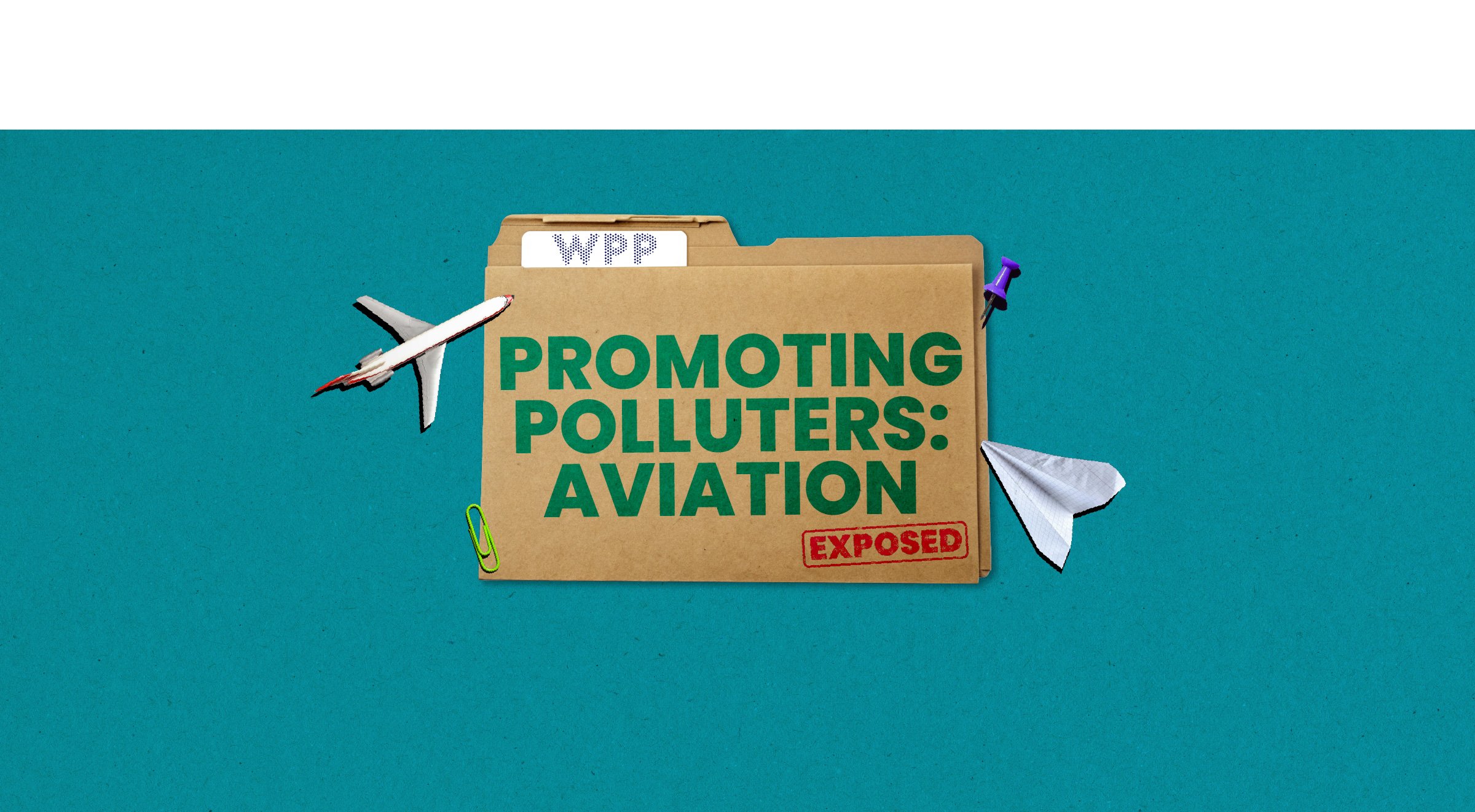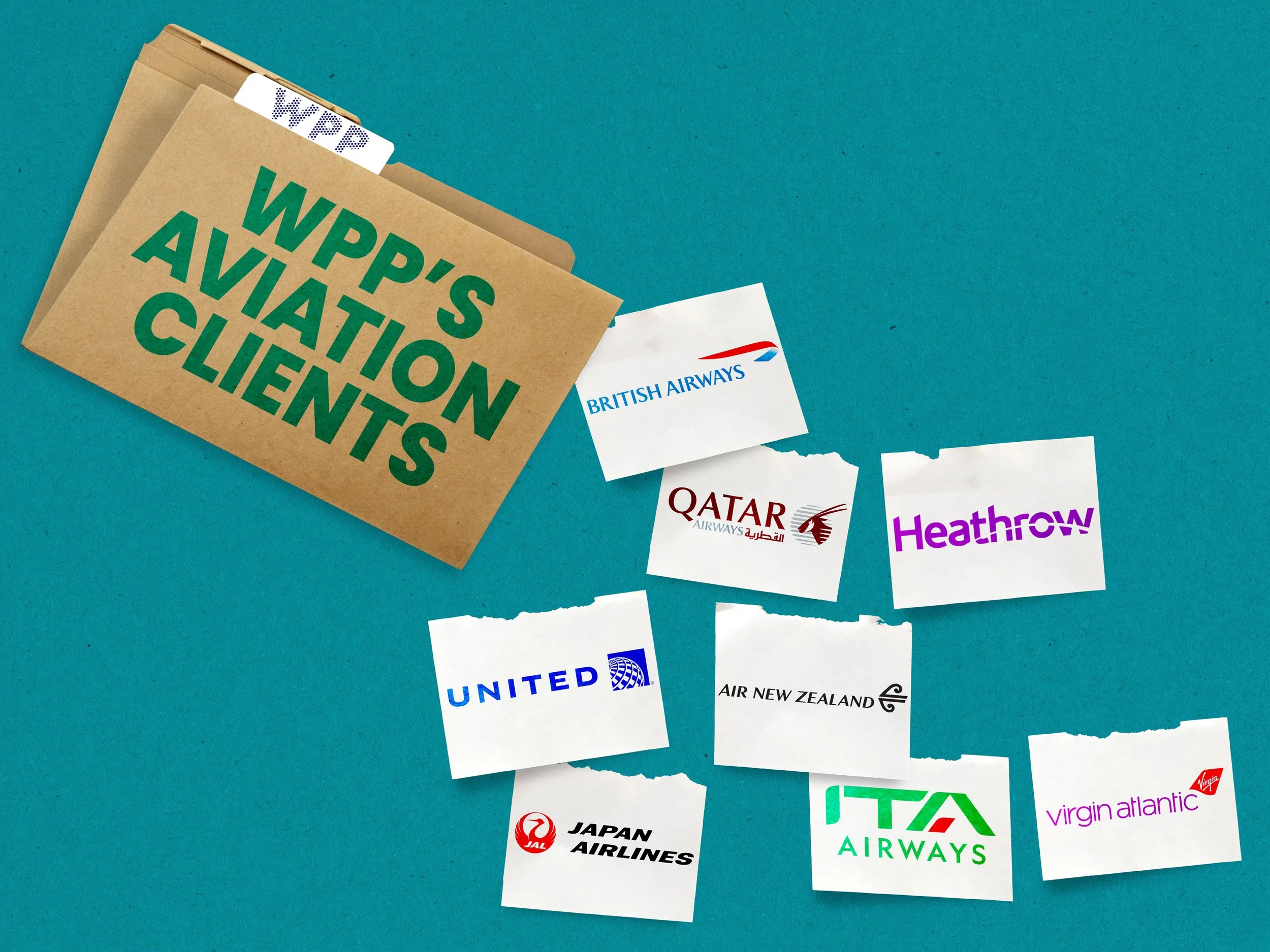
WPP and Aviation: fuelling frequent flying
Aviation is the most polluted and unequal form of transport, a major driver of climate breakdown with no credible plan to reduce pollution in line with global targets. It’s never been more important to scale down aviation, and put in place a just transition towards grounded, mass public transport that is sustainable, affordable, and available to all.
But adverts for carefree holidays abroad via plane are everywhere, from online spaces to TV, cinemas and billboards, and even plastered over sports events; offering cheap flights, luxury travel, an escape when it’s raining or even (apparently unironically) when it’s too hot.
Above: easyJet advert by VCCP and OMD (this advert was not created by WPP): “Taking advantage of this week’s great British heatwave, easyJet has been tempting sweaty commuters to pack their bags in search of colder climates”. 2019.
Airline marketing is both everywhere and highly targeted, shaping an unquestioned, and inescapable, cultural norm of flying as aspirational, alluring and unproblematic.
Reducing the amount we fly, also called demand reduction, is crucial to cutting the climate harms of aviation, and brings benefits including cleaner air, improved health, fairer and more equal access to transport and lower impacts on local communities.
Yet the world’s largest advertising firm, WPP, continues to increase demand for flying. Despite all the evidence of aviation’s climate impacts, WPP’s work continues to normalise and glamourise long distance travel by air.
WPP has worked to drive airline growth through sponsoring Pride events, Christmas ads, tapping into Eurovision, aspirational promises such as “live happy”, family connections, star studded celebrity casting, and even a competitive international cooking TV series. The firm has designed and launched entire airline brands and strategies, rebranded airlines, communicated frequent flyer programs, and created nature-drenched ads for purchasing an unoccupied middle seat through celebrating the “beauty of free space”.
Above: Eurowings advert by WPP agency Scholz & Friends. 2024.
WPP’s current and recent clients include airline giants British Airways, Delta Air Lines, Virgin Atlantic, United Airlines, Lufthansa, Air New Zealand, Japan Airlines, Qatar Airways, Cathay Pacific, Saudia Airlines, AirAsia, TUI and ITA Airways, as well as airports like Heathrow. Most or all of these clients are expanding their passenger networks and operations, contributing even more to aviation’s huge climate impacts and rebounding, catastrophic, impacts on human rights.
Read more about the climate impacts of flying
In the UK, managing demand for flying is supported by members of the public and the Committee on Climate Change (CCC) - who are official government advisors. However, in the absence of meaningful government action to curb the industry’s growth, airlines are determined to expand, and advertisers are paid to make that happen.
Under international guidelines for corporate responsibility, advertisers including WPP should, however, seek to prevent or mitigate the adverse human rights and environmental impacts it is contributing to through its clients.
In a first action of its kind, Badvertising and Adfree Cities are reporting WPP to the Organisation for Economic Co-operation and Development (OECD) for allegedly breaching these guidelines, including through its work for highly polluting airline clients.
Heathrow
WPP agency Wavemaker won a contract with Heathrow airport in 2019, as the airport’s “integrated agency partner”. Wavemaker were tasked with “unlocking revenue growth, increasing passenger numbers and building brand preference and reputation.”
Research found that Heathrow is the second-worst global airport for climate impact, while London is the global city most exposed to air pollution from aviation. According to Jo Dardenne, aviation director at Transport & Environment, air pollution from airports “affects millions of people, who breathe in toxic emissions and develop health conditions as a result.” WPP retained the Heathrow account as recently as 2024.
British Airways
WPP agencies Wavemaker and Ogilvy have worked on adverts for British Airways from at least 2013, with the Visit Mum campaign: “Ticket sales from North America to India on ba.com increased by 65 percent.
In 2021, Ogilvy’s “New York. We’re Back” campaign reworked the iconic ‘Lunch atop a Skyscraper’ scene to welcome back the carrier’s operations after the pandemic (during which most people adapted to travel without flying). This followed previous British Airways campaigns including Made By Britain (2019) and You Make Us Fly (2021). Other WPP agencies working on British Airways adverts include Wavemaker (Purpose, 2023).
BA remains the highest polluter out of UK airlines, producing 7.5 million tonnes of CO2 in 2023.
Freedom of Information (FOI) requests in 2022 by OpenDemocracy found that BA’s parent company, IAG, lobbied against a UK government proposal to require airlines to inform passengers of their trip’s carbon emissions when booking. At the time, BA had the highest emissions per passenger on transatlantic routes. IAG has also lobbied against other pro-climate policies including a frequent flyer levy and a SAF mandate.
It is unclear whether BA remains a client of WPP in 2025.
United Airlines
In 2023, United Airlines produced the most carbon emissions of all US passenger airlines. In 2024, United Airlines was the largest airline in the world, and it plans to further expand its operations.
United Airlines has been a client of WPP agency Wunderman Thompson (now VML) since at least 2014. Recent campaigns include Fly the Friendly Galaxy (2019), Come Fly With Me (2023), with Wunderman Thompson seemingly contributing to Good Leads the Way (2023) by 72andSunny, in which the airline aimed to show “how it is going the extra mile and more to build the future of sustainable flight”.
WPP agency Wavemaker designed a campaign putting ads on taxi tops across New York City, seeing an increase in passenger numbers and 16% growth in “brand favorability" compared to the previous year. It is unclear whether WPP still holds United Airlines as a client.
Above: 2023 Good Leads the Way ad campaign by Wunderman Thompson for United Airlines (this campaign was made with 72andSunny, which is not a WPP agency).
LEVEL
An award winning campaign by WPP agencies Ogilvy and Wavemaker used an “integrated” approach to promote airline LEVEL during Barcelona Pride. The campaign, which aimed to drive brand growth through “an authentic prosocial travel campaign for Barcelona Pride”, resulted in an “18% uplift in bookings and an increase in revenue of 39% during the campaign period”. While steering just shy of ‘pinkwashing’, an airline using LGBTQI+ influencers and a Pride event to sell airline tickets for profit, despite Barcelona’s major rail connections, feels uncomfortable.
See our FAQs to discover more about our OECD complaint against WPP. Please get in touch if you’d like more information.












